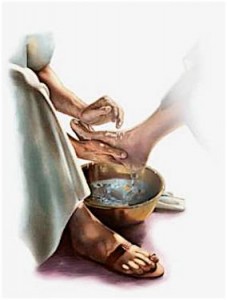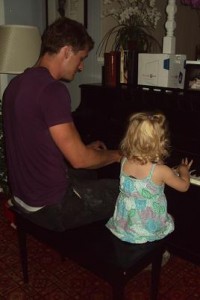 Although motherhood is a big commitment, the Lord promises to be our co-parent. Jesus is an excellent mothering example, despite not having been a mother. In the New Testament he referred to his disciples as children and often handled them (and others) in mother-like ways:
Although motherhood is a big commitment, the Lord promises to be our co-parent. Jesus is an excellent mothering example, despite not having been a mother. In the New Testament he referred to his disciples as children and often handled them (and others) in mother-like ways:
- He worked hard to get time alone. We read, “Jesus went off to the mountain, and they found him…” or “Jesus got up a long while before dawn, but they searched for him…” or “Soon afterward, Jesus went… and his disciples and a large crowd went with him.” (Sound familiar?)
- He often said, “Don’t you remember?” or “I already told you!” or “Don’t you understand?” It seems these 12 men only listened half-way. (Ring a bell?)
- He taught, healed, listened, traveled (all on foot with only rare opportunities to sit down), and washed feet. (Sound like bath time?)
- People pushed Jesus, ran after him, plunked children on his lap, and grabbed his clothes. (Strike a chord?) His response was never to resist but to reach out to these same people with help.
- Jesus had to deal with bickering between his disciples on dozens of occasions: “Who’s the greatest? Who gets to sit by you? Why do you fuss over those children? Why don’t we have anything to eat? Where will we get some money?” (Remind you of anything?)
- Jesus used every question as a teachable moment, turning the challenge back on them by asking his own questions. (Recognize that challenge?)
- Jesus’ entire ministry was a string of interruptions. We read, “He was on the way, when…” (Interruptions = irritation?) He always stopped what he was doing for face-to-face encounters.
- Jesus had people peppering him with demands as he walked along, as he entered the temple, as he preached, and as he tried to get away from the crowds: “Jesus, heal me! Jesus, you must come with me! Jesus, just say the word! Jesus, how can I be saved?” (Are your ears burning?) He always responded with patient love.
- Jesus always forgave. (…not always easy for moms)
 So Jesus was, indeed, a wonderful mothering example, even referring to himself as “like a mother hen” gathering her chicks around her.
So Jesus was, indeed, a wonderful mothering example, even referring to himself as “like a mother hen” gathering her chicks around her.
We know we can’t do it as well as Jesus did, but there are a million ways to try, and striving toward his example is a good place to start.
We do get credit for one parenting characteristic we have in common with Jesus, however. He and we would lay down our lives for our children. The only difference is, he actually did.
“We know what real love is because Jesus gave up his life for us. So we also ought to give up our lives for our brothers and sisters [and children].” (1 John 3:16)
No new prayer requests for Mary tonight (a praise!). We’ll update you as needs arise.



